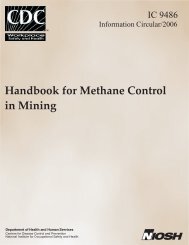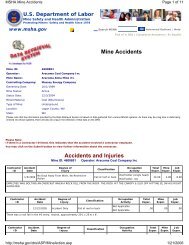American Coal Concert Series Launched - Coal News
American Coal Concert Series Launched - Coal News
American Coal Concert Series Launched - Coal News
You also want an ePaper? Increase the reach of your titles
YUMPU automatically turns print PDFs into web optimized ePapers that Google loves.
4<br />
June 2010<br />
Administration is Using CWA to<br />
Dismantle <strong>Coal</strong> Industry<br />
The Obama Administration is using<br />
the Clean Water Act Section 404<br />
permitting process to dismantle<br />
the coal industry in the Appalachian<br />
region. This is one of the investigation<br />
findings of the Senate Environment and<br />
Public Works Committee Minority Staff<br />
Analysis released by Sen. James Inhofe<br />
(R-Okla) ranking member of the committee.<br />
The report says that after a thorough<br />
investigation of the 235 coal mining<br />
404 Permits that were under review by<br />
EPA as of May 11, 2009, the investigation<br />
found that their obstruction is having<br />
an deleterious effect on rural jobs,<br />
energy production, and small businesses<br />
in Appalachia.<br />
Since the initiation of the investigation,<br />
EPA issued 45 of the 235 permits,<br />
which allowed these projects to move<br />
forward. The investigation, which<br />
included gathering information from<br />
EPA, as well as conducting detailed<br />
interviews with permit applicants, found<br />
that the remaining 190 coal mining<br />
operations tied up at EPA are expected<br />
to produce over 2 billion tons of coal<br />
throughout the life of operations and<br />
support roughly 17,806 new and existing<br />
jobs, as well as 81 small businesses.<br />
To put this in perspective, unless EPA<br />
Senate Minority Report<br />
releases the remaining 190 permits,<br />
roughly 1 in every 4 coal mining jobs in<br />
the Appalachian region will be at risk of<br />
elimination, 81 small businesses will<br />
lose significant income and will be at<br />
risk of bankruptcy and over two years of<br />
America’s coal supply will be in jeopardy.<br />
These impacts hit especially hard<br />
in West Virginia and Kentucky, where<br />
the majority of the delayed mining operations<br />
are located. EPA’s actions, or lack<br />
thereof, will also impact other<br />
Appalachian states, including Ohio,<br />
Pennsylvania, Virginia, Tennessee, and<br />
Alabama, according to the report.<br />
If EPA continues to maintain its hold<br />
Types of Mining Blocked by Adminstration<br />
on Kentucky’s permits, the state will<br />
lose an estimated $127 million in tax<br />
revenue annually. In fiscal year 2008-<br />
2009, Kentucky’s coal industry generated<br />
$282 million in tax revenue for the<br />
state. West Virginia also greatly benefits<br />
from coal revenue. If EPA continues to<br />
maintain its hold on West Virginia 404<br />
Permits, the state will lose an estimated<br />
$217 million in tax revenue annually. In<br />
fiscal year 2009, the West Virginia coal<br />
industry generated $533 million in tax<br />
revenue for the state.<br />
Of particular note, is that the investigation<br />
also revealed the Obama<br />
Administration’s broader agenda to<br />
drastically curtail coal mining in<br />
Appalachia. For decades, the environmental<br />
community has politicized<br />
mountaintop mining by exaggerating its<br />
environmental impacts and stoking<br />
unfounded fear in mining communities.<br />
The investigation shows that the<br />
Administration is exploiting this fear as<br />
a means to block all coal mining operations<br />
in the Appalachian region.<br />
According to the report, the<br />
Administration’s public statements<br />
regarding their review of the 190 mining<br />
permits, including the June 2009<br />
Memorandum of Understanding<br />
between the White House and several<br />
federal agencies, and a variety of press<br />
statements throughout the course of<br />
2009, appear to address mountaintop<br />
mining only. The June 2009 press statement<br />
alone included sixteen references<br />
to “mountaintop mining” while only<br />
mentioning “surface mining” four times<br />
in that same statement. The investigation<br />
found that these statements are<br />
highly misleading. As shown in the figure,<br />
in blocking the 190 coal mining<br />
permits in Appalachia, the<br />
Administration only halted 19 actual<br />
mountaintop mining operations. The<br />
remaining 171 blocked mining operations<br />
included a range of surface,<br />
underground, and refuse operations.<br />
“The report confirms that EPA is<br />
threatening the highest paying jobs in<br />
the region at a time when federal, state,<br />
and local governments are all attempting<br />
to pull this country out of the worst<br />
economic recession in decades,” said<br />
NMA President and CEO Hal Quinn.<br />
“EPA’s policies undermine those efforts.<br />
<strong>Coal</strong> mining jobs are vital to the economic<br />
and social fabric of communities<br />
throughout Appalachia, and the lawful<br />
permits EPA continues to review are<br />
necessary for continued employment at<br />
nearly 200 operations throughout the<br />
region.”<br />
EPA Spruce No. 1 Hearing Draws Hundreds<br />
West Virginia Gov. Joe<br />
Manchin and Rep. Nick<br />
Rahall (D-WVa) strongly condemned<br />
EPA’s actions on the proposal<br />
by EPA to prohibit or restrict mining<br />
activities in streams associated with<br />
the Spruce No. 1 Mine in Logan<br />
County, West Virginia at a pre-hearing<br />
rally arranged by the Friends of <strong>Coal</strong><br />
and FACES of <strong>Coal</strong>.<br />
About 1,000 coal mining supporters<br />
participated in the EPA hearing in<br />
Charleston, West Virginia on the first<br />
Clean Water Act (CWA) permit the<br />
agency has ever proposed to fully<br />
revoke years after its issuance. The<br />
Spruce No. 1 permit for a surface mine<br />
in Logan County was issued in 2007<br />
after an extensive 10-year review,<br />
including preparation of an<br />
Environmental Impact Statement. EPA<br />
announced earlier this year that it was<br />
starting the process to suspend the<br />
permit.<br />
There were about 100 supporters<br />
who spoke at the hearing on the<br />
Spruce project, including local elected<br />
officials, education leaders, and community<br />
members representing churches,<br />
schools, small businesses, and<br />
others. About 40 opponents of the<br />
Spruce Permit, largely comprising<br />
EPA Panel Listen to Speakers<br />
environmental extremists, participated<br />
in the hearing.<br />
“Revoking this permit that was lawfully<br />
issued almost three years ago,<br />
with your agency’s blessing, after<br />
more than ten years of the most comprehensive<br />
environmental review,<br />
again by your agency, is as troublesome,<br />
unnecessary, and arrogant as<br />
anything we’ve ever seen in West<br />
Virginia,” said Bill Raney, President,<br />
West Virginia <strong>Coal</strong> Association. “I<br />
think if you dig deep and honestly<br />
answer the common working man’s<br />
definition of environmental justice,<br />
you’ll find this threat by EPA, your<br />
agency to revoke this permit without<br />
any reason, to be wrong.”<br />
John McDaniel of Arch <strong>Coal</strong> said his<br />
company cannot investigate in the<br />
Spruce mine if the EPA can reject the<br />
permit at any time. “We believe all of<br />
these issues were addressed long ago<br />
and are very disappointed.”<br />
“West Virginia has been implementing<br />
its version of the Clean Water<br />
Act for decades, issuing permits that<br />
contain some of the nation’s most<br />
stringent discharge limits to protect<br />
water quality standards, standards<br />
many states have chosen not even to<br />
adopt,” added Chris Hamilton, Senior<br />
VP, WVCA. “West Virginia’s implementation<br />
of its water quality standards in<br />
permitting programs was unchallenged<br />
by EPA for years, or until the<br />
federal agency sought to hijack the<br />
state’s primary responsibility for water<br />
quality protection by interpreting the<br />
state’s own water standards, and<br />
doing so in such a way that conflicts<br />
with the state’s own interpretation.”<br />
“This situation would be a laughable<br />
exercise in regulatory dysfunction if it<br />
were not so serious, that a federal<br />
agency would use state laws and regulations<br />
as a hammer to take a permit<br />
endorsed by that very state. The EPA<br />
would seek to avoid millions of hours<br />
of analysis and review by the Corps in<br />
the issuance of the project-specific<br />
EIA,” said Jason Bostic, VP, WVCA.<br />
“This is serious situation. Hundreds of<br />
jobs are at stake, millions of dollars of<br />
investment, millions of dollars in<br />
potential tax revenues, and the faith<br />
and participation of the communities<br />
in and around the Spruce mine. The<br />
very communities that EPA somehow<br />
thinks they are protecting by hijacking<br />
their ability to control their own destiny.”<br />
Logan County School<br />
Superintendent Wilma Zigmond drew<br />
applause when she told the panel that<br />
coal provides more than $7.5 million<br />
in property taxes for her district.<br />
“Consider the losses, both financial<br />
and emotional, and the impact this<br />
would have to Logan County School<br />
System. Remember coal keeps the<br />
lights on and our schools running.”<br />
Several speakers traveled a considerable<br />
distance to attend. Kentucky<br />
<strong>Coal</strong> Association Bill Bissett blasted<br />
the EPA. “Your director, Lisa Jackson,<br />
literally says I don’t care about the<br />
economic impact. It’s unfair and it’s<br />
wrong. It’s an injustice.”<br />
Bill Reid, Managing Editor, <strong>Coal</strong><br />
<strong>News</strong>, quoted EPA’s mission, “to protect<br />
human health and to safeguard<br />
the natural environment,” adding he<br />
said “if mines are closed, poverty,<br />
sickness, and mental health problems<br />
occur which is the very opposite of<br />
EPA’s mission, “to protect human<br />
health.” Reid raised point four of EPA’s<br />
purpose, which includes the words<br />
“economic growth.” “If mines are<br />
closed, this is hardly “economic<br />
growth” and it is once again exactly<br />
the opposite of EPA’s mission statement,”<br />
said Reid.
















